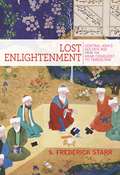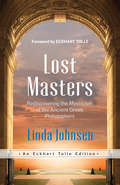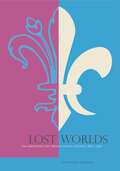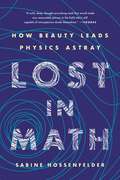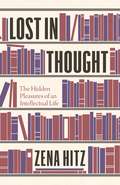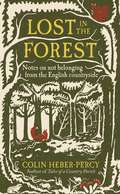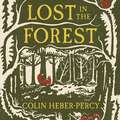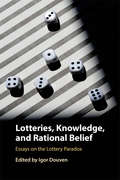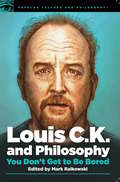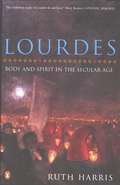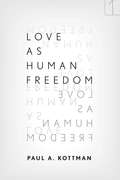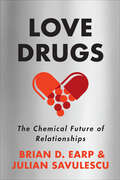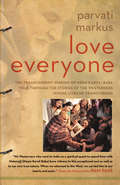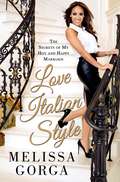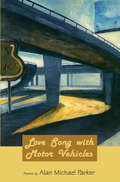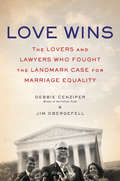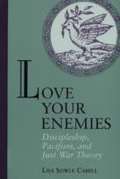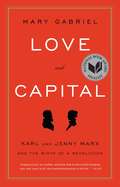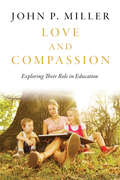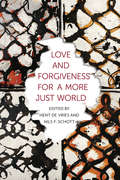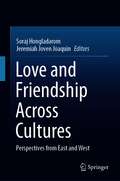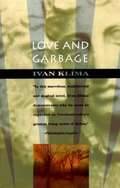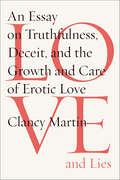- Table View
- List View
Lost Enlightenment: Central Asia's Golden Age from the Arab Conquest to Tamerlane
by S. Frederick StarrIn this sweeping and richly illustrated history, S. Frederick Starr tells the fascinating but largely unknown story of Central Asia's medieval enlightenment through the eventful lives and astonishing accomplishments of its greatest minds--remarkable figures who built a bridge to the modern world. Because nearly all of these figures wrote in Arabic, they were long assumed to have been Arabs. In fact, they were from Central Asia--drawn from the Persianate and Turkic peoples of a region that today extends from Kazakhstan southward through Afghanistan, and from the easternmost province of Iran through Xinjiang, China.Lost Enlightenment recounts how, between the years 800 and 1200, Central Asia led the world in trade and economic development, the size and sophistication of its cities, the refinement of its arts, and, above all, in the advancement of knowledge in many fields. Central Asians achieved signal breakthroughs in astronomy, mathematics, geology, medicine, chemistry, music, social science, philosophy, and theology, among other subjects. They gave algebra its name, calculated the earth's diameter with unprecedented precision, wrote the books that later defined European medicine, and penned some of the world's greatest poetry. One scholar, working in Afghanistan, even predicted the existence of North and South America--five centuries before Columbus. Rarely in history has a more impressive group of polymaths appeared at one place and time. No wonder that their writings influenced European culture from the time of St. Thomas Aquinas down to the scientific revolution, and had a similarly deep impact in India and much of Asia.Lost Enlightenment chronicles this forgotten age of achievement, seeks to explain its rise, and explores the competing theories about the cause of its eventual demise. Informed by the latest scholarship yet written in a lively and accessible style, this is a book that will surprise general readers and specialists alike.
Lost Masters: Rediscovering the Mysticism of the Ancient Greek Philosophers (An Eckhart Tolle Edition)
by Linda JohnsenAshrams in Europe twenty-five hundred years ago? Greek philosophers studying in India? Meditation classes in ancient Rome? It sounds unbelievable, but it’s historically true. Alexander the Great had an Indian guru. Pythagoras, Empedocles, and Plotinus all encouraged their students to meditate. Apollonius, the most famous Western sage of the first century c.e., visited both India and Egypt—and claimed that Egyptian wisdom was rooted in India. In Lost Masters, award-winning author Linda Johnsen, digging deep into classical sources, uncovers evidence of astonishing similarities between some of the ancient Western world’s greatest thinkers and India’s yogis, including a belief in karma and reincarnation. Today ancient Greek philosophers are remembered as the founders of Western science and civilization. We’ve forgotten that for over a thousand years they were revered as sages, masters of spiritual wisdom. Lost Masters is an exploration of our long-lost Western spiritual heritage and the surprising insights it can offer us today.
Lost Worlds: The Emergence of French Social History, 1815–1970
by Jonathan DewaldToday’s interest in social history and private life is often seen as a twentieth-century innovation. Most often Lucien Febvre and the Annales school in France are credited with making social history a widely accepted way for historians to approach the past. In Lost Worlds historian Jonathan Dewald shows that we need to look back further in time, into the nineteenth century, when numerous French intellectuals developed many of the key concepts that historians employ today.According to Dewald, we need to view Febvre and other Annales historians as participants in an ongoing cultural debate over the shape and meanings of French history, rather than as inventors of new topics of study. He closely examines the work of Charles-Augustin Sainte-Beuve, Hippolyte Taine, the antiquarian Alfred Franklin, Febvre himself, the twentieth-century historian Philippe Ariès, and several others. A final chapter compares specifically French approaches to social history with those of German historians between 1930 and 1970. Through such close readings Dewald looks beyond programmatic statements of historians’ intentions to reveal how history was actually practiced during these years.A bold work of intellectual history, Lost Worlds sheds much-needed light on how contemporary ideas about the historian’s task came into being. Understanding this larger context enables us to appreciate the ideological functions performed by historical writing through the twentieth century.
Lost in Math: How Beauty Leads Physics Astray
by Sabine HossenfelderA contrarian argues that modern physicists' obsession with beauty has given us wonderful math but bad science Whether pondering black holes or predicting discoveries at CERN, physicists believe the best theories are beautiful, natural, and elegant, and this standard separates popular theories from disposable ones. This is why, Sabine Hossenfelder argues, we have not seen a major breakthrough in the foundations of physics for more than four decades. The belief in beauty has become so dogmatic that it now conflicts with scientific objectivity: observation has been unable to confirm mindboggling theories, like supersymmetry or grand unification, invented by physicists based on aesthetic criteria. Worse, these "too good to not be true" theories are actually untestable and they have left the field in a cul-de-sac. To escape, physicists must rethink their methods. Only by embracing reality as it is can science discover the truth.
Lost in Thought: The Hidden Pleasures of an Intellectual Life
by Zena HitzAn invitation to readers from every walk of life to rediscover the impractical splendors of a life of learningIn an overloaded, superficial, technological world, in which almost everything and everybody is judged by its usefulness, where can we turn for escape, lasting pleasure, contemplation, or connection to others? While many forms of leisure meet these needs, Zena Hitz writes, few experiences are so fulfilling as the inner life, whether that of a bookworm, an amateur astronomer, a birdwatcher, or someone who takes a deep interest in one of countless other subjects. Drawing on inspiring examples, from Socrates and Augustine to Malcolm X and Elena Ferrante, and from films to Hitz's own experiences as someone who walked away from elite university life in search of greater fulfillment, Lost in Thought is a passionate and timely reminder that a rich life is a life rich in thought.Today, when even the humanities are often defended only for their economic or political usefulness, Hitz says our intellectual lives are valuable not despite but because of their practical uselessness. And while anyone can have an intellectual life, she encourages academics in particular to get back in touch with the desire to learn for its own sake, and calls on universities to return to the person-to-person transmission of the habits of mind and heart that bring out the best in us.Reminding us of who we once were and who we might become, Lost in Thought is a moving account of why renewing our inner lives is fundamental to preserving our humanity.
Lost in the Forest: Notes on not belonging from the English countryside
by Colin Heber-Percy'Colin Heber-Percy is a reliable guide' - THE REVEREND RICHARD COLESWhere am I? Who am I? And why didn't I bring a sandwich...?This book is a hymn to getting lost. Drawing on his experience as a troubled schoolboy, a burnt-out screenwriter at the BBC, an 'awkward' priest in the Church of England, Colin Heber-Percy reflects on the value of not belonging...We all share a desire to belong. There's reassurance and safety in knowing who we are and where we fit in. But at significant moments in our lives - a new job, new school or an unexpected change of circumstances - or just in the ruts and routines of everyday life, we can experience a sense of not belonging, of dislocation, of being lost in a forest. But, there is another way to approach these uneasy moments. Rather than fearing the forest, Colin discovers great value and creativity there.Join parish priest Colin Heber-Percy in an invitation to get lost - to lose the labels society and institutions use to box us in - and to relish the liberation of losing our way in the world. Blending anecdotes from parish life, with philosophy, literature and tales from his local Savernake Forest, Colin argues that there is an overlooked richness, a spirituality and a freedom to be found outside the boundary lines our culture sets for us.Lost in the Forest is a gentle, funny, and life-affirming trail of crumbs through the woods...PRAISE FOR COLIN HEBER-PERCY:'Colin Heber-Percy's prose is flowing and he writes amusingly, perceptively and beautifully' ― KATE GREEN, Country Life'A gentle, generous spirit.' ― SIMON RUSSELL BEALE'A Wordsworthian appreciation of nature and is full of humanity and wisdom.' ― SARAH SANDS, journalist and author of 'The Interior Silence'
Lost in the Forest: Notes on not belonging from the English countryside
by Colin Heber-Percy'Colin Heber-Percy is a reliable guide' - THE REVEREND RICHARD COLESWhere am I? Who am I? And why didn't I bring a sandwich...?This book is a hymn to getting lost. Drawing on his experience as a troubled schoolboy, a burnt-out screenwriter at the BBC, an 'awkward' priest in the Church of England, Colin Heber-Percy reflects on the value of not belonging...We all share a desire to belong. There's reassurance and safety in knowing who we are and where we fit in. But at significant moments in our lives - a new job, new school or an unexpected change of circumstances - or just in the ruts and routines of everyday life, we can experience a sense of not belonging, of dislocation, of being lost in a forest. But, there is another way to approach these uneasy moments. Rather than fearing the forest, Colin discovers great value and creativity there.Join parish priest Colin Heber-Percy in an invitation to get lost - to lose the labels society and institutions use to box us in - and to relish the liberation of losing our way in the world. Blending anecdotes from parish life, with philosophy, literature and tales from his local Savernake Forest, Colin argues that there is an overlooked richness, a spirituality and a freedom to be found outside the boundary lines our culture sets for us.Lost in the Forest is a gentle, funny, and life-affirming trail of crumbs through the woods...PRAISE FOR COLIN HEBER-PERCY:'Colin Heber-Percy's prose is flowing and he writes amusingly, perceptively and beautifully' ― KATE GREEN, Country Life'A gentle, generous spirit.' ― SIMON RUSSELL BEALE'A Wordsworthian appreciation of nature and is full of humanity and wisdom.' ― SARAH SANDS, journalist and author of 'The Interior Silence'
Lost in the Forest: Notes on not belonging from the English countryside
by Colin Heber-Percy'Colin Heber-Percy is a reliable guide' - THE REVEREND RICHARD COLESWhere am I? Who am I? And why didn't I bring a sandwich...?This book is a hymn to getting lost. Drawing on his experience as a troubled schoolboy, a burnt-out screenwriter at the BBC, an 'awkward' priest in the Church of England, Colin Heber-Percy reflects on the value of not belonging...We all share a desire to belong. There's reassurance and safety in knowing who we are and where we fit in. But at significant moments in our lives - a new job, new school or an unexpected change of circumstances - or just in the ruts and routines of everyday life, we can experience a sense of not belonging, of dislocation, of being lost in a forest. But, there is another way to approach these uneasy moments. Rather than fearing the forest, Colin discovers great value and creativity there.Join parish priest Colin Heber-Percy in an invitation to get lost - to lose the labels society and institutions use to box us in - and to relish the liberation of losing our way in the world. Blending anecdotes from parish life, with philosophy, literature and tales from his local Savernake Forest, Colin argues that there is an overlooked richness, a spirituality and a freedom to be found outside the boundary lines our culture sets for us.Lost in the Forest is a gentle, funny, and life-affirming trail of crumbs through the woods...PRAISE FOR COLIN HEBER-PERCY:'Colin Heber-Percy's prose is flowing and he writes amusingly, perceptively and beautifully' ― KATE GREEN, Country Life'A gentle, generous spirit.' ― SIMON RUSSELL BEALE'A Wordsworthian appreciation of nature and is full of humanity and wisdom.' ― SARAH SANDS, journalist and author of 'The Interior Silence'
Lost in the Shell: Mind, Body, Identity and the Technology of Information
by Andrea MontiWhat happens to law when the human body becomes replicable, the mind readable, and identity programmable?This book investigates how artificial intelligence, neurotechnology, and synthetic biology are dismantling the legal foundations of personhood. From biometric doubles and cognitive extraction to bodyoids – human bodies grown without consciousness – the author reveals how legal categories struggle to keep pace with technological realities.Blending legal theory, philosophy, and science, the book exposes a profound crisis: law no longer knows what a 'person' is. This timely and provocative work is essential for scholars in law, bioethics, and technology studies seeking to understand how the post-human era challenges the very structure of the legal order. The future is no longer science fiction. It is a legal vacuum.The book will be of interest to scholars and researchers of law, public policy, AI, and ethics. It will also be a handy guide for practicing lawyers.
Lotteries, Knowledge, and Rational Belief: Essays on the Lottery Paradox
by Igor DouvenWe talk and think about our beliefs both in a categorical (yes/no) and in a graded way. How do the two kinds of belief hang together? The most straightforward answer is that we believe something categorically if we believe it to a high enough degree. But this seemingly obvious, near-platitudinous claim is known to give rise to a paradox commonly known as the 'lottery paradox' – at least when it is coupled with some further seeming near-platitudes about belief. How to resolve that paradox has been a matter of intense philosophical debate for over fifty years. This volume offers a collection of newly commissioned essays on the subject, all of which provide compelling reasons for rethinking many of the fundamentals of the debate.
Louis C.K. and Philosophy
by Mark RalkowskiCharlie Rose has called Louis C.K. "the philosopher-king of comedy," and many have detected philosophical profundity in Louis's comedy, some of which has been watched tens of millions of times on YouTube and elsewhere. Louis C.K. and Philosophy is designed to help Louis's fans connect the dots between his pronouncements and living philosophical themes.Twenty-five philosophers examine the wisdom of Louis C.K. from a variety of philosophical perspectives. The chapters draw upon C.K.'s standup comedy, the show Louie, and C.K.'s other writings. There is no attempt to fit Louis into one philosophical school; instead the authors bring out the diverse aspects of the thought of Louis C.K.One writer looks at the different meanings of C.K.'s statement, "You're gonna be dead way longer than you were alive." Another explores how Louis knows when he's awake and when he's dreaming, taking a few tips from Descartes. One chapter shows the affinity of C.K.'s "sick of living this bullshit life" with Kierkegaard's "sickness unto death." Another pursues Louis's thought that we may by our lack of moral concern "live a really evil life without thinking about it." C.K.'s religion is "apathetic agnostic," conveyed in his thought experiment that God began work in 1982.
Lourdes: Body And Spirit in the Secular Age
by Ruth HarrisLourdes was at the very centre of nineteenth century debates on religion, science and medicine. Both the Church and secularists championed the 'miracle' town as crucial in shaping how society should think about the mind, body and spirit. Since the ‘visions’ of Bernadette Soubirous in 1858 transformed the quiet Pyrenean town into an international tourist and pilgrimage destination, it has been a site for controversy. In her well-crafted and carefully researched book, Harris deftly places Lourdes and its attendant spiritual movement firmly at the centre of French history and shows its significance in the country’s development.
Love As Human Freedom
by Paul A. KottmanRather than see love as a natural form of affection, Love As Human Freedom sees love as a practice that changes over time through which new social realities are brought into being. Love brings about, and helps us to explain, immense social-historical shifts—from the rise of feminism and the emergence of bourgeois family life, to the struggles for abortion rights and birth control and the erosion of a gender-based division of labor. Drawing on Hegel, Paul A. Kottman argues that love generates and explains expanded possibilities for freely lived lives. Through keen interpretations of the best known philosophical and literary depictions of its topic—including Shakespeare, Plato, Nietzsche, Ovid, Flaubert, and Tolstoy—his book treats love as a fundamental way that we humans make sense of temporal change, especially the inevitability of death and the propagation of life.
Love Drugs: The Chemical Future of Relationships
by Julian Savulescu Brian D. EarpIs there a pill for love? What about an "anti-love drug", to help us get over an ex? This book argues that certain psychoactive substances, including MDMA—the active ingredient in Ecstasy—may help ordinary couples work through relationship difficulties and strengthen their connection. Others may help sever an emotional connection during a breakup. These substances already exist, and they have transformative implications for how we think about love. This book builds a case for conducting research into "love drugs" and "anti-love drugs" and explores their ethical implications for individuals and society. Scandalously, Western medicine tends to ignore the interpersonal effects of drug-based interventions. Why are we still in the dark about the effects of these drugs on romantic partnerships? And how can we overhaul scientific research norms to take relationships more fully into account? Ethicists Brian D. Earp and Julian Savulescu say that the time to think through such questions is now. Biochemical interventions into love and relationships are not some far-off speculation. Our most intimate connections are already being influenced by drugs we ingest for other purposes. Controlled studies are underway to see whether artificial brain chemicals can enhance couples therapy. And conservative religious groups are experimenting with certain medications to quash romantic desires—and even the urge to masturbate—among children and vulnerable sexual minorities. Simply put, the horse has bolted. Where it runs is up to us. Love Drugs arms us with the latest scientific knowledge and a set of ethical tools that we can use to decide if these sorts of medications should be a part of our society. Or whether a chemical romance will be right for us.
Love Everyone: The Transcendent Wisdom of Neem Karoli Baba Told Through the Stories of the Westerners Whose Lives He Transformed
by Parvati MarkusA celebration of one of the most influential spiritual leaders of our time: Neem Karoli Baba, the enlightened guru who inspired a generation of seekers—including Ram Dass, Daniel Goleman, and Larry Brilliant—on life-altering journeys that helped change the world.In 1967, Ram Dass returned to the West from India and spread the teachings of his mysterious guru, Neem Karoli Baba, better known as Maharajji. Ram Dass’s words about Maharajji’s life-affirming wisdom resonated with a youth culture that had grown disillusioned with the violence, civil discord, and crude materialism of modern civilization. Hundreds of Westerners traveled to India and experienced Maharajji’s extraordinary presence directly until his death in 1973. His simple directives—love everyone, feed everyone, and remember God—opened their hearts and awakened their souls.What these followers brought back to the West has since changed the landscape of everyday life. Meditation is now mainstream; yoga studios are in every town; and mindfulness is practiced in elementary schools and board-rooms everywhere, from Silicon Valley to Capitol Hill. A stirring piece of history, Love Everyone brings these stories to life, sharing for the first time the inspiring tales of the men and women who followed the siren call of the East to the foothills of the Himalayas, then returned to forever reshape the world.A compelling and inspiring tribute to Maharajji from the Western men and women who knew him best, Love Everyone is a profound teaching on the power of love, as lasting and transformative as the truth, wisdom, and bliss of Maharajji.
Love Italian Style: The Secrets of My Hot and Happy Marriage
by Melissa GorgaReal Housewives of New Jersey star Melissa Gorga shows you how to love your man and keep him happy, satisfied, faithful, and devoted to you. What you see is what you get with Melissa Gorga. On Real Housewives of New Jersey, she's that beautiful, ambitious woman with a successful career who puts her family first. In fact, her stable yet sexy marriage to lovable Joe is a welcome antidote to the constant fighting and backbiting on the show. Despite the pressure of life in the spotlight, she makes marriage look easy. How does she do it? Melissa's overriding principle: Treat your husband like a king! And in return, you'll be treated like a queen! In Love Italian Style, Melissa shares her (and his) secrets to relationship success-generations-tested old-fashioned values served up with a modern, sexy twist. To her, the four tenets to a happy marriage are respect, honesty, loyalty, and passion (underscore passion). By sharing her and Joe's life together-from the story of their first date to how they still keep it hot in the bedroom a decade later-Melissa admits that, yes, marriage has been a lot of work, but the rewards are ten-fold. With her time-tested strategies, you can "Gorganize" your own relationship, strengthen your bond, and amp up the passion for lifelong bliss. Some of Melissa's how-to's:· Dress to impress your man. Flirt with your hubby. ·Cook Italian style. Fight right. Keep the romance alive and the home fires burning. Raise little princes and princesses.This playful guidebook promises to make any marriage better-the Gorga way!
Love Song with Motor Vehicles (American Poets Continuum #Vol. 76)
by Alan Michael ParkerIn Love Song with Motor Vehicles, Alan Michael Parker marshals a penetrating wit and sharp irony that mirrors that of Charles Simic and John Berryman. Parker’s robust imagination explores the music in places poetry doesn’t usually travel. His poems find their epiphanies early on, and, most strikingly, do not close at their endings but, rather, open.Alan Michael Parker is the author of two books of poetry, and co-editor of two scholarly works, The Routledge Anthology of Cross-Gendered Verse and Who’s Who in 20th Century World Poetry (Routledge Books). In 2000, his poems were included in all three major volumes of "younger American poets" (Carnegie Mellon University Press, University of Southern Illinois Press, and University of New England Press).
Love Wins: The Lovers and Lawyers Who Fought the Landmark Case for Marriage Equality
by Jim Obergefell Debbie CenziperThe fascinating and very moving story of the lovers, lawyers, judges and activists behind the groundbreaking Supreme Court case that led to one of the most important, national civil rights victories in decades—the legalization of same-sex marriage.In June 2015, the Supreme Court made same-sex marriage the law in all fifty states in a decision as groundbreaking as Roe v Wade and Brown v Board of Education. Through insider accounts and access to key players, this definitive account reveals the dramatic and previously unreported events behind Obergefell v Hodges and the lives at its center. This is a story of law and love—and a promise made to a dying man who wanted to know how he would be remembered.Twenty years ago, Jim Obergefell and John Arthur fell in love in Cincinnati, Ohio, a place where gays were routinely picked up by police and fired from their jobs. In 2013, the Supreme Court ruled that the federal government had to provide married gay couples all the benefits offered to straight couples. Jim and John—who was dying from ALS—flew to Maryland, where same-sex marriage was legal. But back home, Ohio refused to recognize their union, or even list Jim’s name on John’s death certificate. Then they met Al Gerhardstein, a courageous attorney who had spent nearly three decades advocating for civil rights and who now saw an opening for the cause that few others had before him.This forceful and deeply affecting narrative—Part Erin Brockovich, part Milk, part Still Alice—chronicles how this grieving man and his lawyer, against overwhelming odds, introduced the most important gay rights case in U.S. history. It is an urgent and unforgettable account that will inspire readers for many years to come.
Love Your Enemies: Discipleship, Pacifism, and Just War Theory
by Lisa S. CahillThe author examines the theological bases of just war theory and pacifism, especially in the light of the concept of God, as that motive illuminates Christian discipleship. Differences between the theory of just war and the practice of pacifism are highlighted in the overview of the history of Christian thought on the subject, and the inclusiveness of the ideal of the kingdom for pacifism is emphasized.
Love and Capital: Karl and Jenny Marx and the Birth of a Revolution
by Mary GabrielBrilliantly researched and wonderfully written, LOVE AND CAPITAL is a heartbreaking and dramatic saga of the family side of the man whose works would redefine the world after his death. Drawing upon years of research, acclaimed biographer Mary Gabriel brings to light the story of Karl and Jenny Marx's marriage. We follow them as they roam Europe, on the run from governments amidst an age of revolution and a secret network of would-be revolutionaries, and see Karl not only as an intellectual, but as a protective father and loving husband, a revolutionary, a jokester, a man of tremendous passions, both political and personal. In LOVE AND CAPITAL, Mary Gabriel has given us a vivid, resplendent, and truly human portrait of the Marxes-their desires, heartbreak and devotion to each other's ideals.
Love and Compassion: Exploring their Role in Education
by John P. MillerAcademics often speak about love for their subject, mathematicians discuss their love for figures and numbers, and elementary school teachers speak about their love of children. As multidimensional as love is, it is often a taboo subject relative to teachers and students. In Love and Compassion, John P. Miller explores different forms of love, including self-love, the love of others, compassion, the love of learning, and cosmic love, and how these dimensions of love have the potential to improve education. Love and Compassion is both a practical and conceptual work, and will interest those involved in the study and practise of holistic and contemplative education. In addition to the seven dimensions of love, Miller’s evaluation includes nonviolent action, the love of beauty, and how they are crucial to the practise of teaching.
Love and Forgiveness for a More Just World (Religion, Culture, and Public Life #24)
by Hent De Vries Nils SchottOne can love and not forgive or out of love decide not to forgive. Or one can forgive but not love, or choose to forgive but not love the ones forgiven. Love and forgiveness follow parallel and largely independent paths, a truth we fail to acknowledge when we pressure others to both love and forgive. Individuals in conflict, sparring social and ethnic groups, warring religious communities, and insecure nations often do not need to pursue love and forgiveness to achieve peace of mind and heart. They need to remain attentive to the needs of others, an alertness that prompts either love or forgiveness to respond. By reorienting our perception of these enduring phenomena, the contributors to this volume inspire new applications for love and forgiveness in an increasingly globalized and no longer quite secular world. With contributions by the renowned French philosophers Jacques Derrida and Jean-Luc Marion, the poet Haleh Liza Gafori, and scholars of religion (Leora Batnitzky, Nils F. Schott, Hent de Vries), psychoanalysis (Albert Mason, Orna Ophir), Islamic and political philosophy (Sari Nusseibeh), and the Bible and literature (Regina Schwartz), this anthology reconstructs the historical and conceptual lineage of love and forgiveness and their fraught relationship over time. By examining how we have used—and misused—these concepts, the authors advance a better understanding of their ability to unite different individuals and emerging groups around a shared engagement for freedom and equality, peace and solidarity.
Love and Friendship Across Cultures: Perspectives from East and West
by Soraj Hongladarom Jeremiah Joven JoaquinThis collection brings together different philosophical points of view discussing two important aspects of human life, namely love and friendship, within the broad context of comparative philosophy. These points of view differ in terms of their cultural orientations - East or West, ancient or modern; philosophical methodologies - analytical, historical, experimental, or phenomenological, broadly construed; and motivation - explanatory, revisionary, or argumentative. The volume is a comparative treatment of how diverse philosophical cultures view love and friendship, such as how Aristotle and Confucius’ views on friendship are similar and different, how the ancient Greeks and the Buddhists view friendship and happiness, and how posthumous love is possible. With contributions from a diverse set of scholars, this book presents the emerging views of Southeast Asian philosophers compared with those of philosophers from other regions, including Europe and North America. The volume thus provides a multi-faceted way of understanding love and friendship across cultures, and will be relevant to scholars interested in philosophy, the history of ideas, Asian Studies, and religious studies.
Love and Garbage
by Ewald Osers Ivan KlímaThe narrator has temporarily abandoned his work-in-progress – an essay on Kafka – and exchanged his writer’s pen for the orange vest of a Prague road-sweeper. As he works, he meditates on Czechoslovakia, on Kafka, on life, on art and, obsessively, on his passionate and adulterous love affair with the sculptress Daria.
Love and Lies: An Essay on Truthfulness, Deceit, and the Growth and Care of Erotic Love
by Clancy MartinA provocative and unsettling look at the nature of love and deceptionIs it possible to love well without lying? At least since Socrates's discourse on love in Plato's Symposium, philosophers have argued that love can lead us to the truth—about ourselves and the ones we love. But in the practical experience of erotic love—and perhaps especially in marriage—we find that love and lies often work hand in hand, and that it may be difficult to sustain long-term romantic love without deception, both of oneself and of others. Drawing on contemporary philosophy, psychoanalysis and cognitive neuroscience, his own personal experience, and such famed and diverse writers on love as Shakespeare, Stendhal, Proust, Adrienne Rich, and Raymond Carver, Clancy Martin—himself divorced twice and married three times—explores how love, truthfulness, and deception work together in contemporary life and society. He concludes that learning how to love and loving well inevitably requires lying, but also argues that the best love relationships draw us slowly and with difficulty toward honesty and trust.Love and Lies is a relentlessly honest book about the difficulty of love, which is certain to both provoke and entertain.
